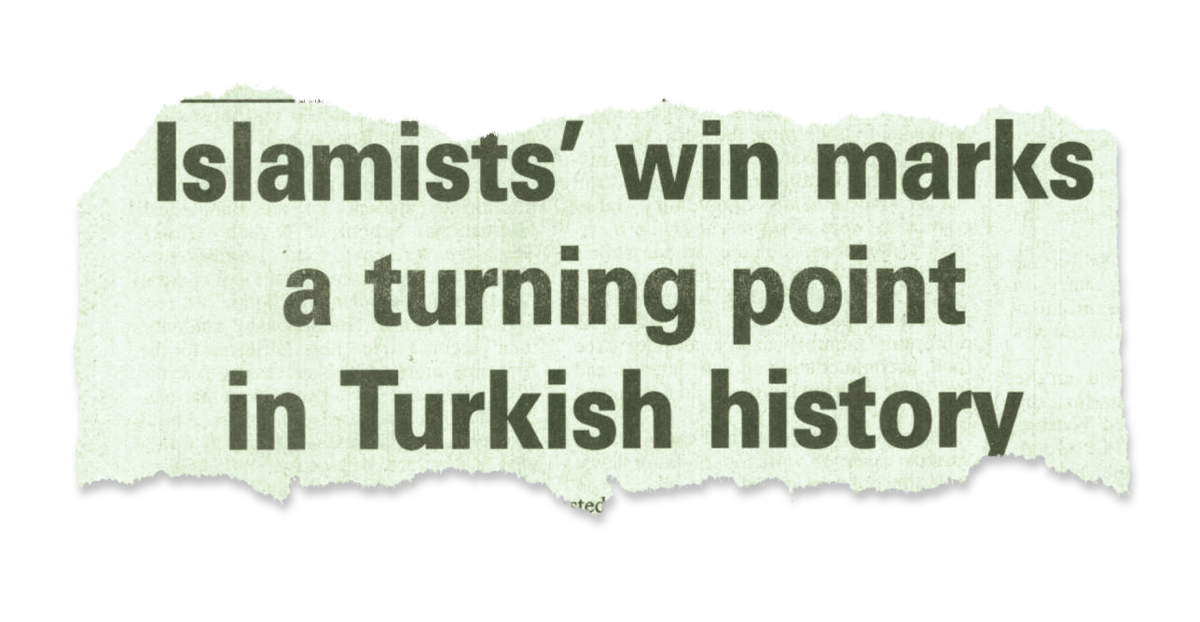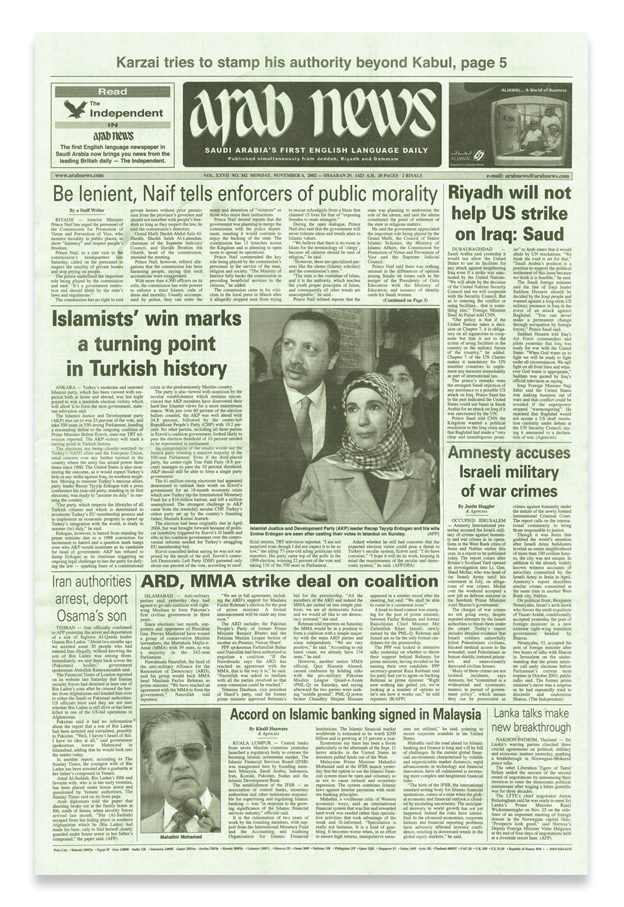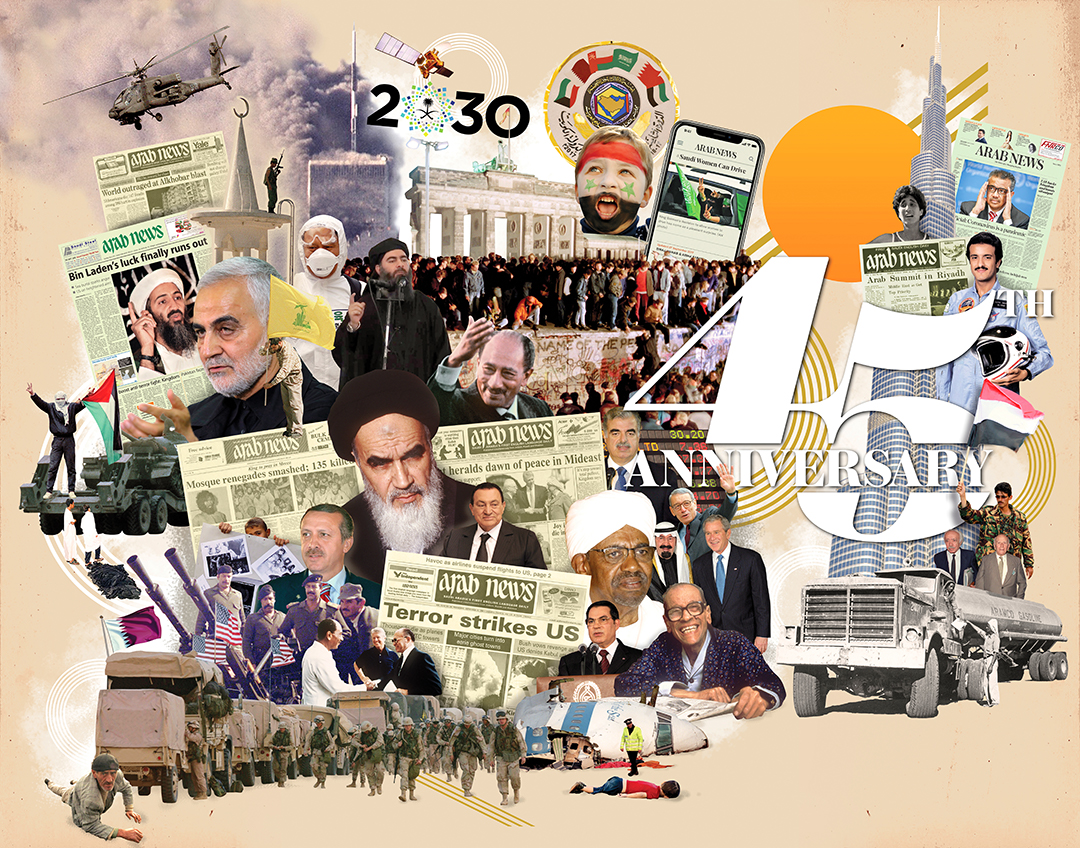Turkish-Arab ties were damaged by Erdogan’s party's neo-Ottoman approach
Summary
On Aug. 14, 2001, Recep Tayyip Erdogan, the former mayor of Istanbul, united the leaders of several previously banned Islamist parties to form Adalet ve Kalkınma Partisi, the Justice and Development Party. The AKP has dominated Turkish politics ever since.
The AKP’s landslide victory in the general election of Nov. 3, 2002 — the first for a party with Islamist roots since the founding of the Turkish republic in 1923 — was a turning point in the country’s history.
Many feared the victory posed a threat to Turkey’s secular constitution, but Erdogan vowed to “build a Turkey where common sense prevails” and pledged that “under our government, Turkey will be in harmony with the world.”
Erdogan served as prime minister from 2003 until 2014, when he became the 12th president of Turkey. Despite accusations of corruption and backsliding on its commitment to secular democratic values, and surviving an attempted military coup in 2016, the AKP has remained in power for the past 17 years.
In 2017, however, the party narrowly won a referendum granting the president sweeping new powers, undermining Turkey’s system of democracy.
ANKARA: I joined Turkey’s Justice and Development Party (AKP) upon the invitation of former Turkish President Abdullah Gul. We met each other when I was ambassador in Riyadh and he was an economist in the Islamic Development Bank. Our relations have remained excellent ever since that time.
Key Dates
-
1
Recep Tayyip Erdogan, the former mayor of Istanbul, founds the conservative Adalet ve Kalkınma Partisi, the Justice and Development Party.

-
2
The AKP retains a majority in the general election, a performance it repeats in 2011.
-
3
With more than 51 percent of the vote, Erdogan is elected president of Turkey.
-
4
The AKP loses a majority in a general election, leading to a hung parliament.

-
5
Erdogan calls a snap general election, which returns the AKP to a majority government.
-
6
A failed coup attempt by military factions concerned that “the democratic and secular rule of law has been eroded by the current government” leads to a state of emergency, widespread arrests and purges of government officials.
-
7
The AKP narrowly wins a referendum abolishing the post of prime minister, granting the president sweeping new powers and transforming Turkey’s political system from parliamentary to presidential.
-
8
The AKP joins forces with the ultra-right-wing Nationalist Movement Party to form the People’s Alliance, which wins a majority in the general election. Erdogan is re-elected president.

As I was the only founding member acquainted with international relations, my colleagues in the party thought I should draft the “Foreign Relations” chapter of the party program. Here is what I wrote at that time regarding Turkey’s relations with the Middle East: “Turkey maintains strong historical and cultural relations with all countries in the Middle East. The AKP will build upon these foundations and cooperate with them in all fields to carry further ahead these valuable assets. It will do everything to eliminate misunderstandings and boost the relations in all fields.”
When we won the elections and I became foreign minister, we immediately started to implement these promises. A few months after the AKP came to power, the Turkish Parliament — where the AKP was holding two-thirds of the seats — rejected a US proposal to open a second front in the north of Iraq because it believed that the American invasion would bring nothing but calamity to this Arab country.
The AKP consolidated Turkey’s relations with all countries in the region and beyond. It prioritized soft power in its ties with all nations. In a 2008 election for temporary membership of the UN Security Council, Turkey was supported by 151 of the 192 voting countries.
Having lived for several years in Saudi Arabia, both Prime Minister Gul and I were fully aware of the importance of closer relations with Riyadh, so we gave priority to further improving them. There were already strong relations that went back several centuries. In the late 1980s, Turkey’s late President Turgut Ozal and King Fahd gave a new impetus to these friendly relations. They transformed them into cooperation in several areas. I was ambassador in Riyadh during that period and Saudi authorities opened wide all doors for me, and the Saudi government bestowed on me the Order of King Abdulaziz (First Class) for my contribution to Turkish-Saudi friendship.

Having lived for several years in Saudi Arabia, both Prime Minister Gul and I were fully aware of the importance of closer relations with Riyadh
Yasar Yakis
The momentum accelerated when King Abdullah visited Turkey in 2006 and again in 2007. The second time was in combination with the summit of the Organization of Islamic Cooperation. President Gul and Prime Minister Recep Tayyip Erdogan, deviating from the established practice of receiving foreign heads of state in the presidential palace, visited King Abdullah in his hotel room. This was a show of appreciation for the king and the importance that Turkey’s top two leaders attributed to Saudi Arabia.
These two countries also cooperated in the US-led anti-Daesh coalition, but Turkey’s commitment was not as strong as many other members. In August 2014, Sheikh Abdulaziz bin Abdullah Al-Sheikh, the Grand Mufti of Saudi Arabia, condemned Daesh, saying: “Extremist and militant ideas and terrorism are not in any way part of Islam.” During the same period, in an unfortunate coincidence, then-Prime Minister Ahmet Davutoglu used a narrative belittling Daesh as “nothing but a group of furious youths.” This attempt to trivialize Daesh’s threat has been brought back to the forefront now that he has announced the establishment of a new political party called “Future.”

A page from the Arab News archive from Nov. 11, 2002.
Turkey’s deviation from its traditional policy of not meddling in Arab affairs started with its military support for the Muslim Brotherhood in Syria and Libya, and political support for the organization in Egypt, because the AKP was heavily inspired by the Muslim Brotherhood’s ideology. In the divide between most Arab countries on the one side and Qatar on the other, Turkey sided with Qatar, again probably because of its Muslim Brotherhood inclination.
“Turks want leaders who will empty out the corrupt soup that Turkish politics has become and act with justice and honesty.”
From an Arab News editorial, Nov. 5, 2002
Mustafa Kemal Ataturk, the founder of the Republic of Turkey, had in 1934 instructed an under-secretary in the Foreign Ministry, saying: “Turkey’s close relations with many Arab countries are valuable assets. We have to maintain and improve them, but this should not turn to meddling in intra-Arab affairs and Turkey should not attempt to give advice unless they ask.” Turkey is now doing the exact opposite of this.
Davutoglu’s neo-Ottomanist ideology added insult to injury. The school curriculum in Turkey says that Ottomans brought peace, justice and stability to the Middle East and the Balkans. Many in Turkey cherish these ideas, but those who studied history from other sources know that the Ottoman legacy in the Middle East and the Balkans is remembered more for its negative aspects.
Turkey has to put aside this battered ideology and keep in mind that the Ottoman state collapsed 100 years ago, so it has to base its relations with the countries of the former Ottoman Empire on today’s realities.
- Yasar Yakis is a former foreign minister of Turkey and founding member of the ruling AK Party. Twitter: @yakis_yasar














